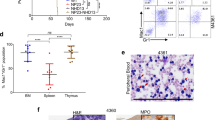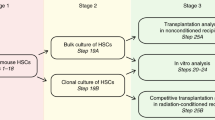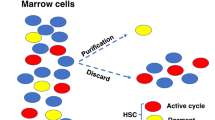Abstract
WITHIN a few days after infection of susceptible mice with the Friend polycythaemia virus (FVP), a large increase in red cell production occurs leading to polycythaemia1–3. The mechanism by which FVP induces this effect is not known although it has been shown that this induction does not result from the presence of erythropoietin (Ep) in the inoculum and is not dependent on the endogenous production of Ep (refs 1 and 3). As yet, no system for both infection in vitro and subsequent expression of erythroid differentiation in vitro has been described. We have developed a method whereby infection of spleen cells can be accomplished in vivo and the late events of erythroid differentiation can be studied in vitro. We report that spleen cells cultured soon after infection in vivo, before increases in haemoglobin synthesis are detectable, will later increase their rate of haem, or haemoglobin, synthesis in vitro. The effect of Ep on the FVP-induced erythroid differentiation was also tested.
This is a preview of subscription content, access via your institution
Access options
Subscribe to this journal
Receive 51 print issues and online access
$199.00 per year
only $3.90 per issue
Buy this article
- Purchase on Springer Link
- Instant access to full article PDF
Prices may be subject to local taxes which are calculated during checkout
Similar content being viewed by others
References
Mirand, E. A., Steeves, R. A., Lange, R. D., and Grace, J. T., Jr, Proc. Soc. exp. Biol. Med., 128, 844–849 (1968).
Tambourin, P., and Wendling, S., Nature new Biol., 234, 230–233 (1971).
Hankins, W. D., and Krantz, S. B., J. natn. Cancer Inst., 52, 1223–1229 (1974).
Krantz, S. B., and Jacobson, L. O., Erythropoietin and the Regulation of Erythropoiesis (Univ. Chicago Press, Chicago, 1970).
Krantz, S. B., Gallien-Lartigue, O., and Goldwasser, E., J. biol. Chem., 238, 4085–4090 (1963).
Krantz, S. B., Life Sci., 4, 2393–2397 (1965).
Gallien-Lartigue, O., and Goldwasser, E., Science, 145, 277–279 (1964).
Zajdela, F., Tambourin, P., Wendling, F., and Pierre, O., C.r. hebd. séanc. Acad. Sci., Paris, 267, 2394–2396 (1968).
McGarry, M. P., and Mirand, E. A., Expl Hematol., 1, 174–182 (1973).
Gurney, C. W., Wackman, N., and Filmanowicz, E., Blood, 17, 531–546 (1961).
Reisman, K. R., and Udupa, K. B., Cell Tissue Kinet., 5, 481–489 (1972).
Axelrad, A. A., McLeod, D. L., Shreeve, M. M., and Heath, D. S., in Second International Workshop on Hemopoiesis in Culture (edit. by Robinson, A.), 226–234 (DHEW Publication No. (NIH) 74–205, 1973).
Author information
Authors and Affiliations
Rights and permissions
About this article
Cite this article
HANKINS, W., KRANTZ, S. In vitro expression of erythroid differentiation induced by Friend polycythaemia virus. Nature 253, 731–732 (1975). https://doi.org/10.1038/253731a0
Received:
Revised:
Published:
Issue Date:
DOI: https://doi.org/10.1038/253731a0
This article is cited by
Comments
By submitting a comment you agree to abide by our Terms and Community Guidelines. If you find something abusive or that does not comply with our terms or guidelines please flag it as inappropriate.



